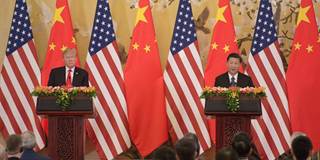If governments are going to engage in trade wars, they should have a clear and pragmatic vision of where they want to end up. Yet the trade war initiated by the Trump administration seems less like a tough negotiating tactic, and more like a guessing game.
MILAN – Some observers interpret the trade war that US President Donald Trump has initiated with China as a tough negotiating tactic, aimed at forcing the Chinese to comply with World Trade Organization rules and Western norms of doing business. Once China meets at least some of Trump’s demands, this view holds, mutually beneficial economic engagement will be restored. But there are many reasons to doubt such a benign scenario. The long China-US trade war is really a manifestation of a fundamental clash of systems.

MILAN – Some observers interpret the trade war that US President Donald Trump has initiated with China as a tough negotiating tactic, aimed at forcing the Chinese to comply with World Trade Organization rules and Western norms of doing business. Once China meets at least some of Trump’s demands, this view holds, mutually beneficial economic engagement will be restored. But there are many reasons to doubt such a benign scenario. The long China-US trade war is really a manifestation of a fundamental clash of systems.